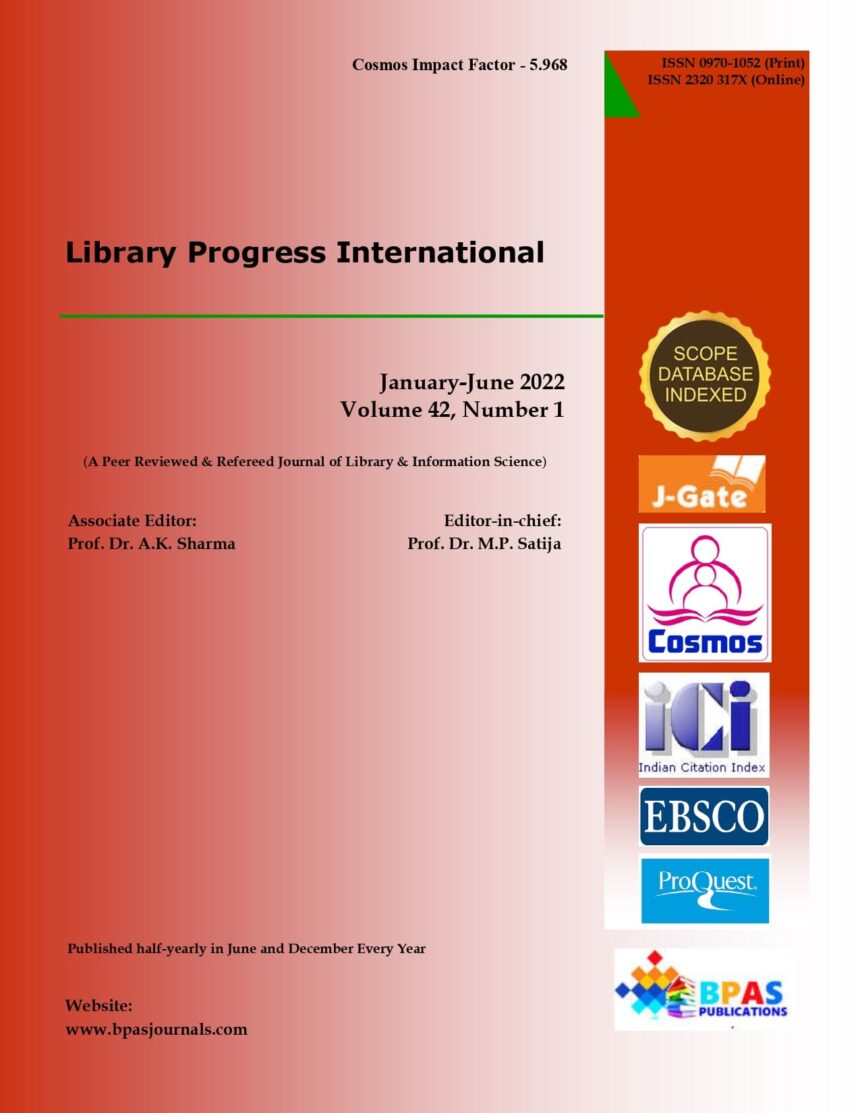Knowledge Management and Information Professionals in 21st Century Academic Libraries in Nigeria
DOI:
https://doi.org/10.48165/Keywords:
Knowledge, Management, Information, Professionals, 21st Century, Academic, LibrariesAbstract
Knowledge management is an essential area of activity in organizations. It harnesses valuable information resources for the benefit of patrons and success of 21st century academic libraries. Academic libraries have important role in updating its practices in knowledge management which increases enviable technological devices and sophiscated system of storage and retrieval. Thus the paper highlights the concept of knowledge management, knowledge application management, knowledge dissemination management, knowledge management skills for information professionals, importance of knowledge management in academic libraries and knowledge management tools. Thus the paper posits that academic libraries adopt knowledge innovation management, in order to deliver library services through innovative library technology to ensure they remain relevant in the 21st century. It was recommended among others that knowledge management practices should be inculcated into academic libraries in the provision of library services and information dissemination to patrons. Also, information professionals should constantly update their skills and competencies in order to be key players in knowledge management phenomenon.
Downloads
References
Alan, F. (2012). Knowledge management definition retrieved from Alanhttp://www.knowledge
management:definition.html.
Balcombe, J. (1999). Getting out of the box: The role of information professionals in knowledge management. The Law Librarian, 3 (12), 91-94.
Bello, A. (2008). Knowledge management in academic libraries: Trends issues and challenges. World Journal of Research and Review, 6(2), 20-25.
Broadbent, M. (1998). The phenomenon of knowledge management, what does it mean to the information professional? Information Outlook, 2(5), 23-34.
Chase, R.L. (1998). Knowledge navigators. Information Outlook¸ 2(9), 17-20.
Corrral, S. (1998. Are we in the knowledge management business? Adriadne, 18. Retrieved from www.ariadne.ac.uk/issue/18/knowledge
-mgt.
Dalkir, K. (2011). Knowledge management in theory and practice. (2nd ed). Cambridge, MA, USA: MIT Press, pp.47.
Danland, H. (2016). Managing knowledge in academic libraries: Are we, should we, LIBER quarterly, 26(1), 28-41.
D01:http://doi.org/110.183521q.10154 How
Davenport, T. & Prusak, L. (2000).Working knowledge: organizations manage what they know. Boston, Ma: Harvard Business School Press, Pp.5.
David-West, B.T. & Alex-Nmecha, J.C. (2019). Mentoring: A tool for career development in academic libraries. Library Philosophy and Practice 47-75. Retrieved from
http://digitalcommons.unl.edu/iibphi/pr ac/763/
Dei, D. J. & Walt, V. B. (2020). Knowledge management practice in universities: The role of communities of practice. Journal of Social Sciences and Humanities, 2(1), 2590-
D01:10. 1016ig.ssaho.2020.100025. 12. Emezie, N.A. & Nwaohiri, N.M. (2013). 21st Century librarians and effective information service delivery: Information impact: Journal of Information and Management, 4(1), 30-43.
Ganhi, S. (2004). Knowledge management and reference services. Journal of Academic Librarianship, 30(5), 368-381.
Husain, S. & Nazim, M. (2013). Concepts of knowledge management among library and information science professionals. International Journal of Information Dissemination and Technology, 3(4), 264-269.
IFLA, (2009). IFLA knowledge management section. IFLA knowledge management newsletter. Retrieved from http://archive.ifla.org/vii/S47/pub/km
Newsletter
Jain, P. (2009). Knowledge management for 21st century information professionals. Journal of Knowledge Management Practice, 10-22, n.p.
Jain, P. (2013). Knowledge management in academic libraries and information centres: A case of university libraries. Journal of Information and Knowledge Management, 12(4).
Morris, A. (2001). Knowledge management opportunities for LIS graduates. 67th IFLA conference. Retrieved from http://www.ifla67papers015-aepdf5.
Obasikene, J.I. (2008). Knowledge delivery for sustainable development in the 21st century Nigeria: Toward seffective globalization and competitiveness. In: E.ya PE, Nwangwu, I.G. & Asogwa, G.E (Eds). Constructive Knowledge Societies for Sustainable
Development, Enugu: Prince Digital Press, pp.13-28.
Owen, I.M. (1999). Knowledge management and information professionals. Information Service Use, 10(1), 7-16.
Patil, S.S. (2013). Knowledge management in libraries. International Journal of Digital Libraries and Knowledge Management, 3(2), 71-72.
Reddy, K.J. (2017). Knowledge management in 21st century academic libraries. International Journal of Library and Information Studies, 7(2), 115-120.
Sanchez, R. (2001). Knowledge management and organizational competence. Oxford University Press, New York pp.3-37.
Shahong, I. (2000). Knowledge management in libraries in the 21st century. 6th IFLA council and general conference, Jerusalem, Israel 3-18 August, www.ifla.org.
Skgrme, D. (1997). Knowledge management: Making sense of an oxymoron. Management Insight, 2(2), n.p. Retrieved from
http://www.skyrme.com/insights/22km. htm
Thanuskodi, S. (2010). A bibliometric study. Journal of Social Science, 24(2), 77-80. 27. Townley, C.T. (2001). Knowledge management and academic libraries. College and Research Libraries, 62(1), 44-55. 28. Wadas, L.R. (2017). Mission statements in academic libraries: A discourse analysis. Library Management, 38(2/3), 108-116. D01:10.1108/LM-07-2016054.
Wenger, E. (2001). Communities of practice. In N.J. Sinelser & P.B. Baltes (Eds). International Encyclopedia of the Social and Behavioural Sciences, pp. 2339-2342. Oxford Pagamo.

